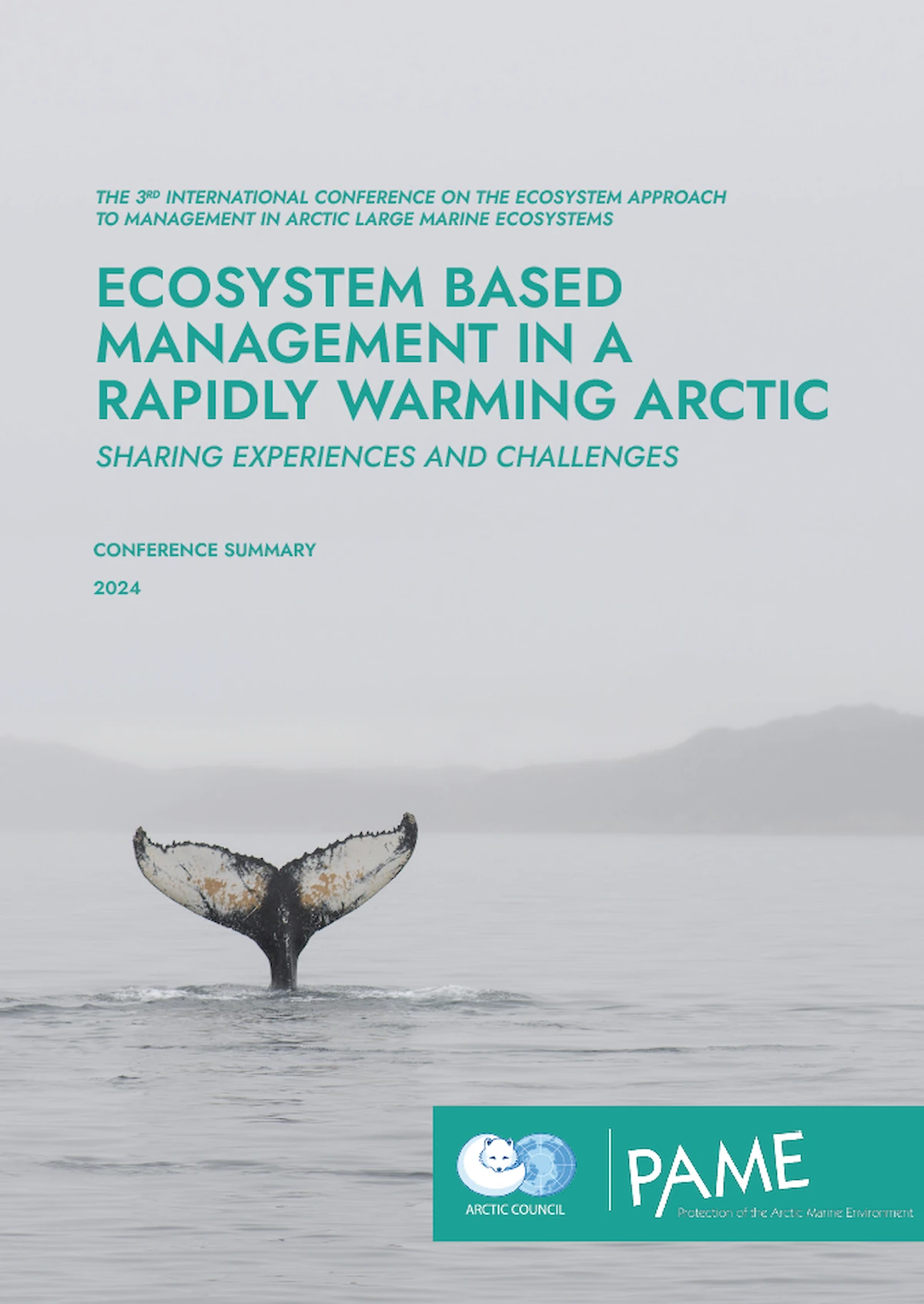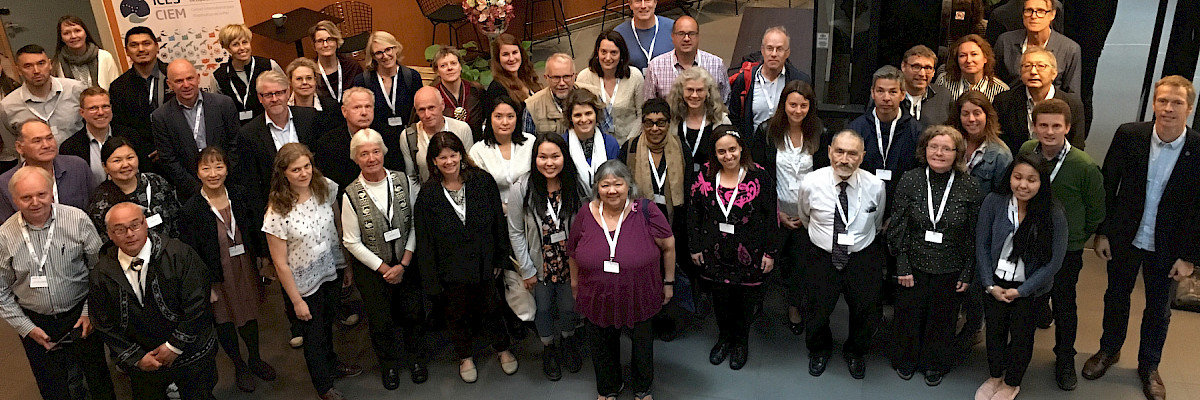
EA Conferences
THIRD EA CONFERENCE
Where: Tromsø, Norway
When: 15-18 April 2024
Program: Download
Conference speakers, abstracts, presentations and videos have been made available here.
Conference Report available here.
Strengthening cooperation on Ecosystem Based Management across the marine Arctic is among the main priorities for the Norwegian Chairship of the Arctic Council 2023-2025 and facilitating the implementation in the 18 Arctic Large Marine Ecosystems is the main goal of the joint PAME, CAFF, AMAP, SDWG -EA expert group.
In April 2024, the Norwegian Chairship of the Arctic Council and the Institute of Marine Research hosted the Third International Conference on the Ecosystem Approach to Management in the Arctic Large Marine Ecosystems in Tromsø, Norway. This conference was led by the joint PAME-AMAP-CAFF-SDWG EA expert group with the permanent participants ICC and Saami and the observers ICES and WWF.
The conference spanned across three main components of the EA framework –“Governance/Policy” and “Knowledge/Science” and the “communication links” which includes the goals, advice and value, making the link between “Governance/Policy” and “Knowledge/Science” operative.
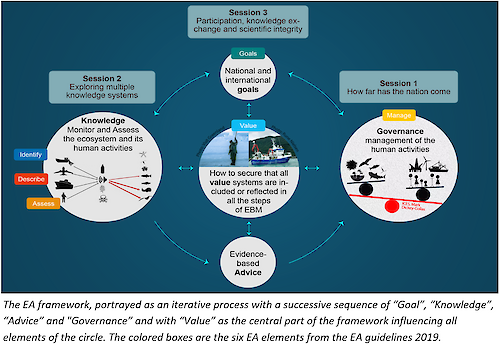 The Conference brought together 246 science, industry, policy and management experts from the Arctic Council states and from Europe and Asia (total 27 countries) as well as three of the six Permanent Participants, including the Saami Council, the Aleut International Association, and the Inuit Circumpolar Council, academics, non-profit organizations, and students to explore implementation of the ecosystem approach in the arctic. A total of 35 presentations and Interviews were provided with questions and panel discussions.
The Conference brought together 246 science, industry, policy and management experts from the Arctic Council states and from Europe and Asia (total 27 countries) as well as three of the six Permanent Participants, including the Saami Council, the Aleut International Association, and the Inuit Circumpolar Council, academics, non-profit organizations, and students to explore implementation of the ecosystem approach in the arctic. A total of 35 presentations and Interviews were provided with questions and panel discussions.
The conference also showcased a program for young professionals and young knowledge holders in attendance at the conference. Associated young scientists had interactive panel discussions, poster sessions, speeches and evening events. Participants explored a number of topics including: best practices in ecosystem-based management related to cooperation and governance; incorporating multiple knowledge systems to improve integrated ecosystem assessments; and improved participation, knowledge and scientific integrity in EA policy making.
The Conference Report report makes a concentrated extraction from each presentation, panel and question-session of the “solutions” and “examples” on how we can move forward in developing EBM and implementation. To see the full presentations, questions and panel discussions, the links to those videos are provided throughout the report.
The Conference Report is built hierarchical, with a concentrated text provided to the Ministerial Declaration 2025 first, then short extractions from each talk/interview and questions/panels and suggested themes for the 4th International conference, and finally a more extensive extraction of the presentations/interviews followed by a video link if the reader would like to have access to the entire presentation as it was provided at the conference.
SECOND EA CONFERENCE
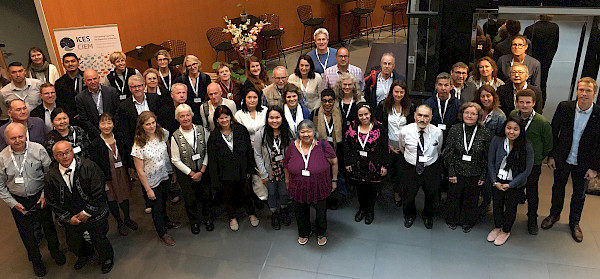 Where: Bergen, Norway
Where: Bergen, Norway
When: 25-27 June
Program: Download (24. June - final version)
The Ecosystem Approach to Management (EA) is a widely adopted management principle that requires integrated management across sectors of human activities to achieve sustainable use of natural resources while maintaining the integrity of the ecosystem. The EA approach has been acknowledged, defined and adopted by the Arctic states working under the Arctic Council. In 2013 (Kiruna Declaration), the Arctic Council agreed that there was a need for periodic reviews of EA implementation in the Arctic to exchange information on integrated assessment and management experiences. A first international conference was held in Fairbanks, Alaska, in August 2016 to review status of EA implementation. A second Arctic EA conference will be held in Bergen, Norway, in early summer 2019.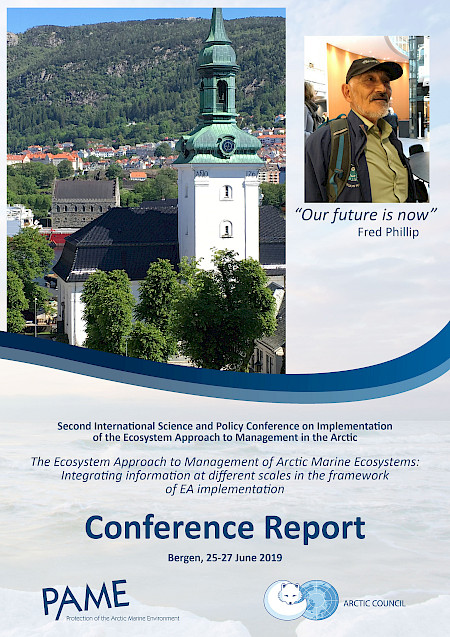 Large Marine Ecosystems (LMEs) have been recognized as appropriate scale and units to apply the EA to management of the Arctic marine and coastal environment, with due recognition of their open boundaries and the need to integrate information and management across different scales within and beyond an LME. The second conference to review EA implementation in the Arctic will focus on the scale integration issue. Scale integration in the context of EA implementation applies equally to the natural and social sciences that provide the knowledge base for decisions (e.g. through Integrated Ecosystem Assessment), and the management structures and processes where management decisions are made. Local and Traditional Knowledge (LTK) provides equally important information and insight about scale integration, EA implementation and management. LTK will be an element of all topics and discussions during the Conference.
Large Marine Ecosystems (LMEs) have been recognized as appropriate scale and units to apply the EA to management of the Arctic marine and coastal environment, with due recognition of their open boundaries and the need to integrate information and management across different scales within and beyond an LME. The second conference to review EA implementation in the Arctic will focus on the scale integration issue. Scale integration in the context of EA implementation applies equally to the natural and social sciences that provide the knowledge base for decisions (e.g. through Integrated Ecosystem Assessment), and the management structures and processes where management decisions are made. Local and Traditional Knowledge (LTK) provides equally important information and insight about scale integration, EA implementation and management. LTK will be an element of all topics and discussions during the Conference.
Program with abstracts and links to presentations.
Presentations:
Opening session: Conference opening
- Geir Huse (Norway, Scientific Director, Institute of Marine Research)
- Anne-Christine Brusendorff (Denmark, ICES)
- Mayor Harry K. Brower, Jr. (USA, Utqiagvik)
- Hein Rune Skjoldal (Norway, Institute of Marine Research)
Session 1: Integrated Ecosystem Assessment
- Elena Eriksen (Norway, Institute of Marine Research)
- Per Arneberg (Norway, Institute of Marine Research)
- Andrea Niemi (Canada, Fisheries and Oceans)
- Tom Christensen (Denmark, Aarhus University)
- Sue Moore (USA, NOAA, retired; University of Washington)
- Judith Rosellon-Druker (USA, University of Alaska Fairbanks)
- Fern Wickson (Norway, North Atlantic Marine Mammal Commission)
- Per Arneberg (Norway, Institute of Marine Research)
- Lisa Eisner (USA, NOAA Fisheries)
- Bérengère Husson (Norway, Institute of Marine Research)
- Sue Moore (USA, NOAA, retired; University of Washington)
- Hein Rune Skjoldal (Norway, Institute of Marine Research)
- Phillip Wallhead (Norway, Norwegian Institute for Water Research)
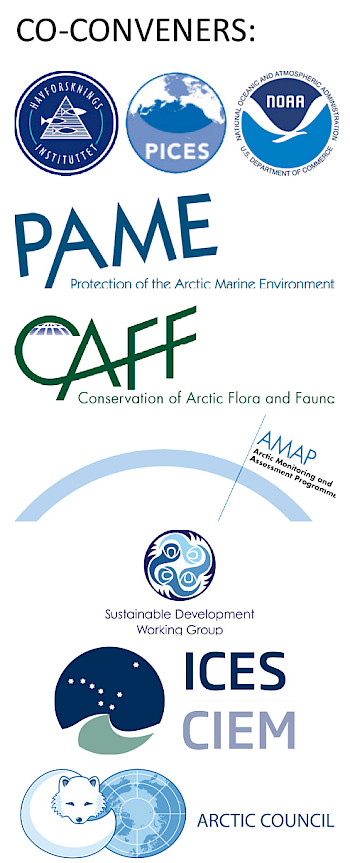 Session 2: MPA's and other special areas
Session 2: MPA's and other special areas
- Lauren Wenzel (USA, NOAA Fisheries)
- Boris Solovyev (Russia, Russian Academy of Sciences)
- Martine Giangioppi (Canada, World Wildlife Fund)
- Martin Sommerkorn (Norway, World Wildlife Fund)
- Boris Solovyev (Russia, Russian Academy of Sciences)
- Elizabeth Logerwell (USA, NOAA Fisheries)
- Ole Anders Turi (Norway, Sámediggi/Sámi Parliament)
- Lis L. Jørgensen (Norway, Institute of Marine Research)
- Wenting Chen (Norway, Norwegian Institute for Water Research)
- Gerold Janssen (Germany, Leibniz Institute of Ecological Urban and Regional Development)
- Sheku Sei (Sierra Leone, University of Sierra Leone)
- “Resource user perception evaluation for the establishment of Marine Protected Areas in Sierra Leone”
Session 3: Voices from the North - A conversation about people, nature and sustainability
- Fred Phillips and Mellisa Heflin (USA, Bering Sea Elders Group)
- Nicole Kanayurak (USA, Utqiagvik, North Slope Borough Department of Wildlife Management)
- Gerry Inglangasuk (Canada, Inuvialuit Member, Fisheries Joint Management Committee) and Alan Kennedy (Canada, Chairman, Fisheries Joint Management Committee)
- Andrea Niemi/Lianne Postma - TBC and Elizabeth Hiltz (Canada, Fisheries and Oceans)
Session 4: National EA Implementation
- Cecilie von Quillfeldt (Norway, Norwegian Polar Institute)
- Daniel Van Vliet (Crown Indigenous Relations and Northern Affairs Canada)
- Elizabeth Logerwell (USA, NOAA Fisheries)
- Boris Solovyev (Russia, WWF Russia/Russian Academy of Sciences)
- Anders Mosbech (Denmark, Aarhus University)
- Bjarne Lyberth (Greenland, The Association of Fishers & Hunters in Greenland)
- Mandy Karnauskas (USA, NOAA Fisheries)
- Daniel Taukie (Canada, Nunavut Tunngavik Inc.)
- Gunn-Britt Retter (Norway, Saami Council)
Session 5: Central Arctic Ocean
- Alf Håkon Hoel (Norway, University of Tromsø; presented by Hein Rune Skjoldal)
- Hein Rune Skjoldal (Norway, Institute of Marine Research)
- Vasily Spiridonov (Russia, Russian Academy of Sciences)
- Are Olsen (Bjerknes Centre for Climate Research/Geophysical Institute, University of Bergen)
FIRST EA CONFERENCE
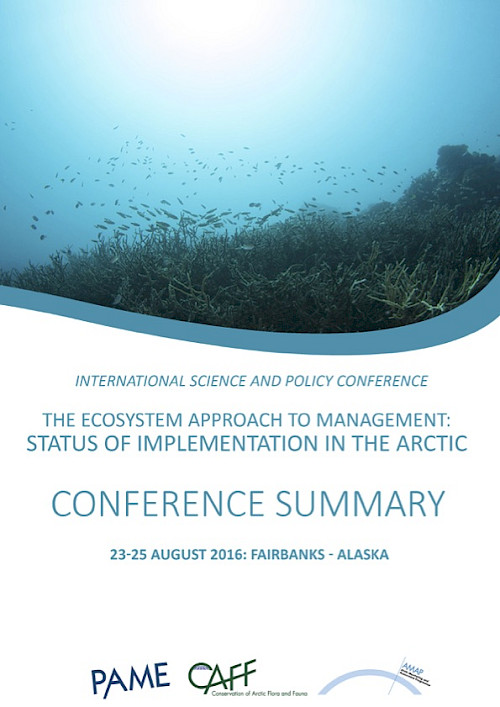 Conference Summary: The Ecosystem Approach to Management (EA) is a widely adopted management principle requiring management of human activities to be integrated across sectors of enterprise. The ultimate purpose of EA is to achieve sustainable use of natural resources, while maintaining the integrity of the ecosystem. The EA approach has been acknowledged, defined and adopted by the Arctic States working under the Arctic Council. Working groups of the Arctic Council have been engaged for more than a decade in developing aspects of the scientific, policy and indigenous foundations of the knowledge that enable the implementation of the ecosystem approach.
Conference Summary: The Ecosystem Approach to Management (EA) is a widely adopted management principle requiring management of human activities to be integrated across sectors of enterprise. The ultimate purpose of EA is to achieve sustainable use of natural resources, while maintaining the integrity of the ecosystem. The EA approach has been acknowledged, defined and adopted by the Arctic States working under the Arctic Council. Working groups of the Arctic Council have been engaged for more than a decade in developing aspects of the scientific, policy and indigenous foundations of the knowledge that enable the implementation of the ecosystem approach.
The conference will bring together experts and practitioners to examine the scientific, policy and indigenous understandings and experience of the ecosystem approach to management in the eighteen Large Marine Ecosystems of the Arctic and corresponding terrestrial areas. Topics to be addressed include scientific elements such as Integrated Ecosystem Assessment, as well as national policies such as Integrated Arctic Management and the Inuvialuit Settlement Agreement that are designed to carry out integrated management in an adaptive fashion. Proceedings from the conference will be presented to the ministerial meeting of the Arctic Council in spring 2017.
- Click here to download the Conference Summary
- Click here to download the online conference program
- List of participants
Objectives:
- Benchmark the status of implementation of EA in the Arctic
- Present innovative examples of best practices in EA implementation
- Identify priorities for future collaboration on EA implementation in the Arctic Themes
Themes:
- Knowledge base – integration of knowledge (including traditional) and Integrated Ecosystem Assessment
- Governance – integration across sectors, institutional arrangements
- Scale integration – integration across small to large scale in ecosystems, and integration across management levels.
Co-conveners and Organising Committee: The Arctic Council working groups PAME, AMAP and CAFF with experts from Arctic Council member states, Permanent Participants and Observer organizations (WWF).
| Title | Name | Presentation | Abstract | Video |
Session I: The Vision and Role of the Arctic Council |
||||
|
Ecosystem Based Management in the Arctic Council; Status and Prospects |
Alf Håkon Hoel | Download | Download | View |
|
Achievements of the Arctic Council Implementing the Ecosystem Approach to Management |
Hein Rune Skjoldal | Download | Download | View |
|
Challenges and tasks on the road to implementing the ecosystem approach to management in the Arctic |
Phillip Mundy | Download | Download | View |
Session II: Status and Experiences from National Implementation |
||||
|
Integrated Arctic Management and the US Strategy |
Jim Kendall |
Download | View | |
|
The Norwegian ecosystem approach management plan for the Barents Sea; strengths, flaws and further developments |
Gro van der Meeren | Download | Download | View |
|
Inuvialuit Environmental and Wildlife Co-Management in Canada’s Western Arctic |
Patrick Gruben | Download | Download | View |
|
Implementing EA Iceland Shelf and Sea LME |
Ólafur Ástþórsson | Download | Download | View |
|
Oceans Management in Canada |
Martine Giangioppi | Download | Download | View |
Session III: Making EA operational - developing the knowledge base and enabling activities |
||||
|
Ecosystem Approach to Management and Integrated Ecosystem Assessment |
Jason Link | Download | Download | View |
|
Making the Ecosystem Approach operational across the Atlantic |
Mark Dickey-Collas | Download | Download | View |
|
Highlighting the work of the OSPAR Convention |
Charlotte B. Mogensen | Download | Download | View |
|
Work in two ICES Working Groups for Integrated Ecosystem Assessment – WGIBAR for the Barents Sea and WGINOR for the Norwegian Sea Large Marine Ecosystems |
Hein Rune Skjoldal | Download | Download | View |
|
Ecosystem-based management in Norway: Pioneering implementation of regional-scale marine spatial planning |
Erik Olsen | Download | Download | View |
|
Food security as an organizing principle for implementing the ecosystem approach to management in the Arctic; an indigenous perspective |
Carolina Behe | Download | Download | View |
|
NGO Perspective on Implementation of the Ecosystem Approach in the Arctic: Progress and Possibilities |
Becca Gisclair | Download | Download | View |
|
The Integrated Ecosystem Model for Alaska and Northwest Canada: An interdisciplinary decision support tool to inform adaptation to Arctic environmental change |
W. Robert. Bolton | Download | Download | View |
|
The Distributed Biological Observatory: A Marine Change Detection Array in the Pacific Arctic |
Jackie Grebmeier | Download | Download | View |
|
The Arctic Marine Pulses Model: Linking Contiguous Ecological Domains in the Pacific Arctic |
Jackie Grebmeier | Download | Download | View |
|
Harnessing the Global Observing and Data System to Support Ecosystem-based Fisheries Management in the Arctic: Current Status and Future Directions |
Peter Pulsifer | Download | Download | View |
|
Evaluation of methods for assessing cumulative effects on marine ecosystems |
Per Arneberg | Download | Download | View |
|
Integrated Landscape Assessment: North Slope Rapid Ecoregional Assessment |
Jamie Trammell | Download | Download | View |
|
Effects of Multiple Stressors on The Benthic Ecosystem in the Barents Sea |
Lis Jorgensen | Download | Download | View |
|
Spatial distribution of chlorophyll a and its impact factors analysis in the Arctic Ocean during the summer of 2014 |
Zhibo Lu | Download | Download | View |
Session IV: Case studies - steps toward implementation |
||||
|
Adaptive co-management of beluga in the Inuvialuit Settlement Region |
John Noksana Jr. | Download | Download | View |
|
Bottom-up approaches to managing conflict in Arctic Marine Ecosystems – the Open Water Season Conflict Avoidance Agreement and the Arctic Waterways Safety Plan |
Martin Robards | Download | Download | View |
|
Conservation Approaches and Indigenous Participation: Streamlining Co-management of Living Marine Resources |
Nicole Kanayurak | Download | Download | View |
|
Insights into a Changing Arctic: Long-term beluga monitoring in the Inuvialuit Settlement Region |
Shannon MacPhee | Download | Download | View |
|
The cultural aspect of forced migration secondary to Sea Level Rise |
Lesley Laukea | Download | Download | View |
|
Cross-scale co-management successes: A case study of government-to-government and Native-to- Native governance in the Bering Strait Region |
Kelsey Aho | Download | Download | View |
|
Ecosystem Based Management in the Arctic: From definition to action |
Lis Jorgensen | Download | Download | View |
|
Gino Graziano - Response to invasive species in Alaska with the Ecosystem Approach - The role of Education |
Gino Graziano | Download | Download | View |
|
Past, current, and future forest harvest and regeneration management in Interior Alaska boreal forest: adaptation under rapid climate change |
Miho Morimoto | Download | Download | View |
|
Towards an Ecosystem Approach for Management of Bristol Bay Estuaries |
Todd Radenbaugh | Download | Download | View |
|
Which benefits can marine mammals gain from an Ecosystem Approach to Management? |
Jill Prewitt | Download | Download | View |
Session V: Pan-Arctic Marine Science and Policy |
||||
|
Dynamic Interplay: A new model of governance for the Arctic |
Kaja Brix | Download | Download | View |
|
AMSA's Application to the Ecosystem Approach to Management in the Arctic |
Lawson Brigham | Download | Download | View |
|
The Circumpolar Biodiversity Monitoring Program (CBMP) |
Becci Anderson | Download | Download | View |
|
Highlighting steps towards Implementing Ecosystem Approach for Arctic Contaminants |
Jon Fuglestad | Download | Download | View |
Session VI: Status of Implementing the Ecosystem Approach to Management in the Arctic |
||||
|
Panel Presentation on next steps in Implementing the Ecosystem Approach in the Arctic |
Panel | Download | ||
|
Moving forward: What is the role of the Arctic Council in Implementing the Ecosystem Approach and how could/should it facilitate this |
Panel | Download | ||
Acknowledgements:

 Arctic Council Working Group
Arctic Council Working Group 